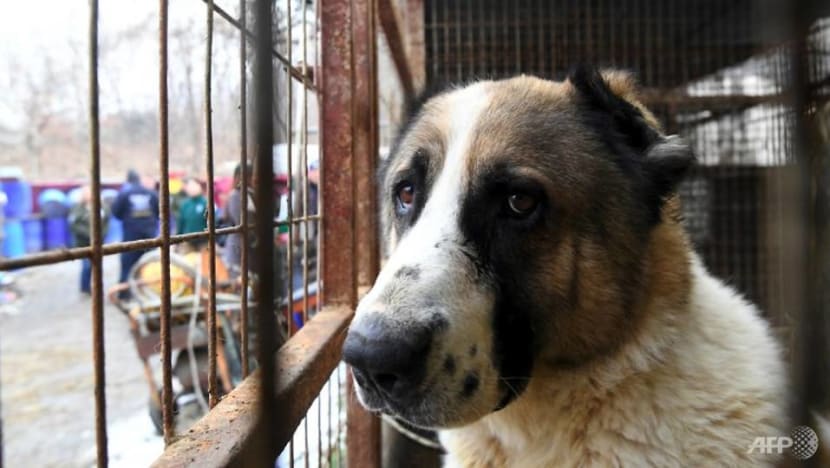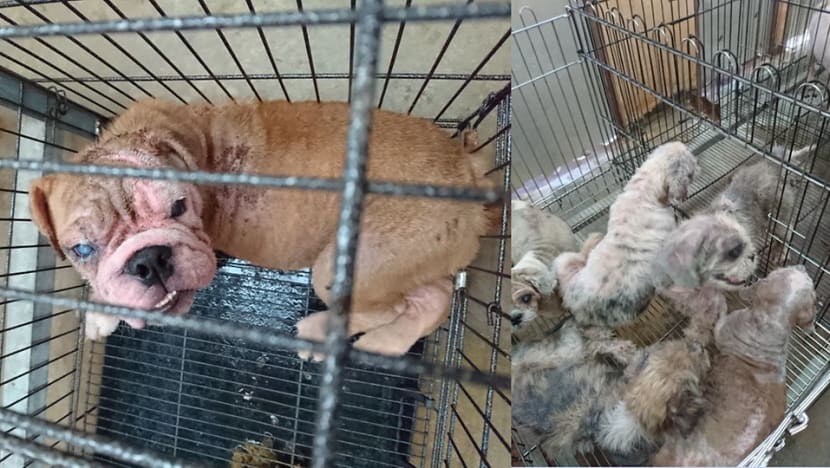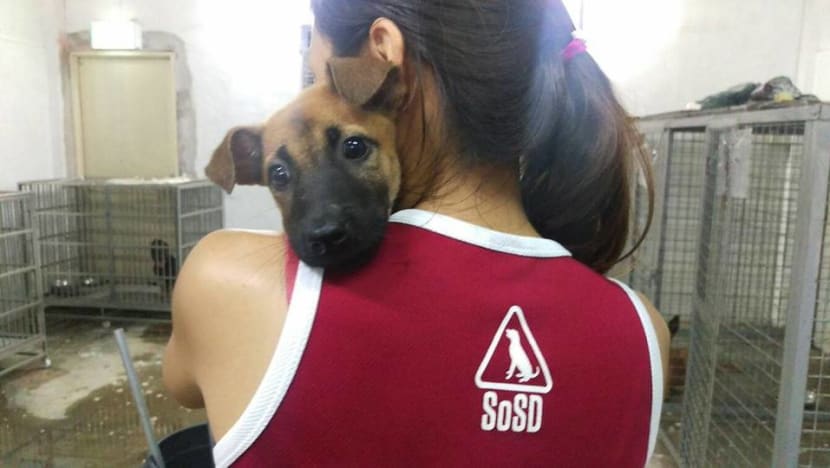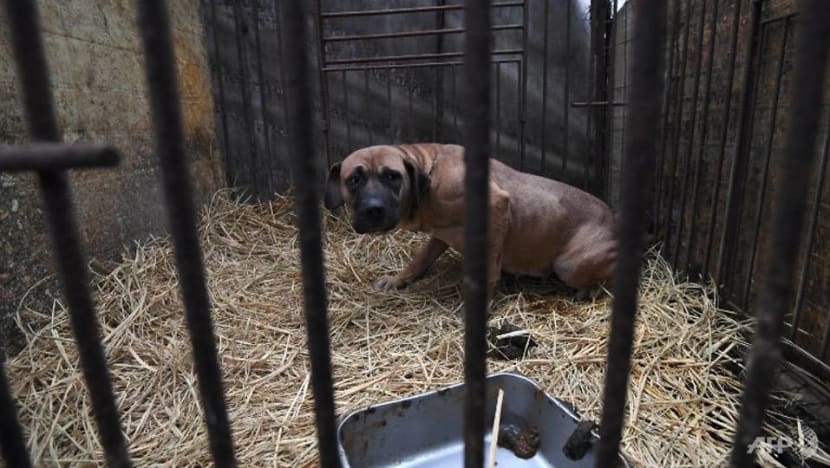commentary Commentary
Commentary: If everyone detests puppy mills, why do they still exist?
Prospective dog owners should educate themselves, and avoid buying from puppy mills, says animal welfare group SOSD's Dr Siew Tuck Wah.

A dog looks out from a cage at a dog farm during a rescue event, involving the closure of the farm organised by the Humane Society International (HSI) in Namyangju on the outskirts of Seoul. (Photo: AFP/Jung Yeon-Je)
SINGAPORE: It is difficult to resist cute puppies behind window displays in a pet store, their longing eyes begging us to bring them home.
Yet few know that almost every puppy for sale in Singapore comes from a puppy mill, whether local or overseas.
They are products of a multi-million dollar industry that has been exploiting animals for commercial gain for many decades.
HIDDEN FROM THE PUBLIC EYE
Puppy mills are commercial establishments which breed puppies for sale, often intensively, on a large scale, and in appalling, cramped conditions.
Breeding animals suffer a worse fate than their sold-off offspring as mass breeding machines, where they are engineered to push out litter after litter of puppies, with little attention paid to their health, food and care.
In Singapore, most puppy farms are located in farmway areas such as Pasir Ris. Among them, 32 are registered with the Agri-Food and Veterinary Authority of Singapore (AVA).
Puppy mills used to be largely unknown to the public in Singapore. However, a rescue of 85 dogs from a commercial puppy mill in Pasir Ris in April 2010 exposed the horrors which went on behind closed doors.
The dogs were kept in filthy, small cages with little room to move around. Many suffered from severe skin problems, tick fever and pyometra (infection of the womb) and required urgent, extensive and expensive medical care. Some passed away despite rescuers’ best efforts.

RISING AWARENESS AND TIGHTER CONTROLS
There has been greater awareness about the cruelty behind puppy mills since 2010. AVA has also made significant improvements in the licensing and regulation of puppy mills in Singapore, including putting in place higher standards for those who sell animals as pets through a code of conduct for the pet industry.
Pet businesses are expected to comply with higher minimum standards of care and encouraged to adopt stipulated best practices on animal housing, management and care. Failure to meet minimal standards can be used to support prosecution or other enforcement actions to ensure animal welfare.
Since then, more frequent inspections seemed to have been carried out , with errant breeders taken to task and receiving heavier penalties.
In June last year, a breeder of a Pasir Ris pet farm was fined S$180,000 after a surprise inspection by AVA officers found dogs under his care suffering from poor health. One pomeranian was found completely blind, a husky had open wounds and five dogs were found with eye problems, including ulcers and swelling. It was a clear sign that AVA was serious about improving the conditions in puppy mills.
Crackdowns like these may serve as cautionary tales to puppy mills, but enforcement will remain a challenge if AVA manpower continues to be limited. The situation has improved compared to a decade ago, but conditions still vary greatly from puppy mill to puppy mill.
Stories of dogs found in dire conditions are also still commonplace. Just last year, SOSD Singapore rescued eight dogs with severe untreated medical conditions. They had been sick for years and were not given adequate medical care. Clearly, animal abuse and neglect still goes on in puppy mills, behind closed doors.

INCREASED ILLNESSES AND BEHAVIORAL PROBLEMS
Studies have shown that there are increased incidences of distressing behavioural and emotional problems in dogs from puppy mills compared to dogs from more humane sources. They are also more aggressive towards their owners, people around them, and other dogs.
Dogs used for breeding in puppy mills are not spared either.
A 2011 study by the University of Pennsylvania, highlighted that breeding dogs not only had worse health problems, but also exhibited more persistent and extreme behaviour problems including aggressive reactions stemming from various phobia and, learning deficits.
EDUCATION IS KEY
Almost everyone is repulsed by the idea that so many dogs are born into savage conditions. Why then do puppy mills still thrive?
The truth is such heart-breaking conditions will persist despite best efforts from legislators, enforcement officers and animal welfare groups.
The industry is driven by demand. As long as people purchase these puppies, puppy mills will always be in operation, whether locally or overseas. Many pet stores that import puppies from other countries such as Australia obtain their supply of puppies from puppy mills.
The nature of a puppy mill, which is profit-driven, also suggests that owners are incentivised to spend less on space, food and care for these animals, especially those used for breeding. Most will never be able to fully provide the physical and mental stimulation and conditions needed for a dog to be healthy without charging an exorbitant price.
So the key to solving the problem lies not only in legislation, but also in public education.

Education about alternatives to buying puppy mill dogs have to be more robust. More government-led and public-driven campaigns need to be conducted to further increase public awareness of conditions in the puppy mill industry.
Singapore is maturing into a compassionate society. Once the true nature of puppy mills is laid bare for the public to see, I strongly believe that Singaporeans will not choose to turn a blind eye but will seek out more humane alternatives, where the desire to bring home a dog stems from an inherent love for animals.
Adopting a dog from a shelter not only saves the life of the animal but also helps to address the stray dog situation in Singapore.
People who prefer to buy a dog should do their due diligence to make sure they buy from responsible breeders rather than puppy mills and familiarise themselves with the reputation, track record and breeding practices of the breeder their dog comes from.
Doing so will not only ensure the health and quality of the puppy, but safeguards against pet owners contributing to the expansion of a trade that mistreats animals.
MORE HELP NEEDED TO OVERCOME HUDDLES TO ADOPTION
Singapore is on the right track in terms of animal welfare. The situation here is improving compared to a decade ago and is better than in some neighbouring countries, where animal welfare laws are lacking.
Today, many breeding dogs are rescued and put up for adoption by animal welfare groups such as Voices for Animals. They now have a much better fate than their predecessors, most of which were killed once they outlived their reproductive life.

However, Singaporeans still face significant roadblocks to adoption.
Archaic HDB rules state that we can only keep one small breed dog per HDB flat.
Most of the 1,500 dogs in animal shelters for adoption, on the other hand, are medium-to large-sized dogs which, according to the law, cannot be kept in HDB flats.
Unless these rules change to give Singaporeans more leeway in adopting dogs, it is always more convenient for prospective pet owners to pop into the nearest pet store, and purchase the next cute puppy they see.
Dr Siew Tuck Wah is President of SOSD, a Singapore-based organisation dedicated to rescuing, rehabilitating and rehoming stray and abandoned dogs.














